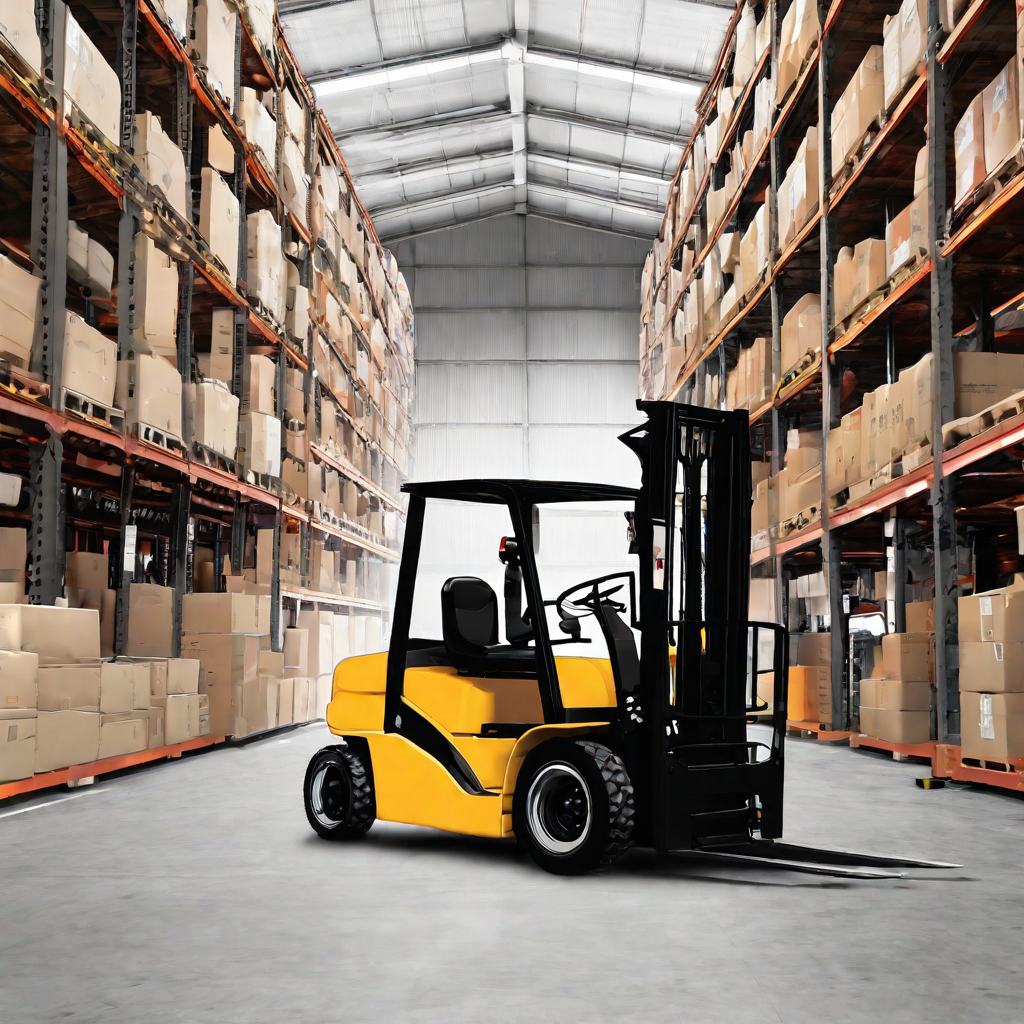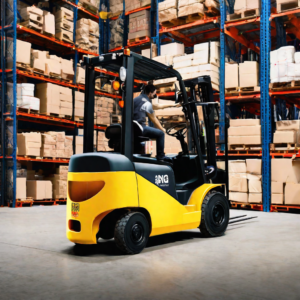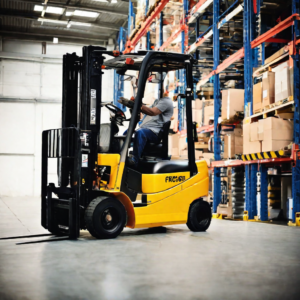
Articles

Forklift truck plays a crucial role in various industries, revolutionizing material handling and warehouse operations. These versatile machines are designed to lift, transport, and stack heavy loads with precision and efficiency. So, in this article, we will delve into the world of forklift trucks, exploring their functionalities, applications across industries, safety considerations, and the benefits they bring to businesses. Join us as we uncover the power of forklift trucks and their impact on modern-day logistics.
Understanding Forklift Trucks and Their Capabilities:
Forklift trucks, which are also referred to as lift trucks or industrial trucks, are powered vehicles designed with fork-like prongs for the purpose of lifting and moving materials. They are available in various configurations such as counterbalance, reach trucks, pallet jacks, and order pickers, with each type specifically tailored to perform certain tasks in specific environments. Forklift trucks are equipped with hydraulic systems that enable precise lifting and lowering of loads, making them essential machines in warehouses, distribution centers, manufacturing facilities, and construction sites.
Forklift Trucks in Warehouse Operations:

In warehouse operations, forklift trucks are the workhorses that ensure smooth material flow and efficient storage. So, these machines excel at loading and unloading goods from trucks, moving pallets, and stacking items on racks. With their maneuverability and lifting capacity, enable efficient utilization of warehouse space, optimizing storage density and facilitating quick access to inventory. They are also instrumental in inventory management, order picking, and facilitating just-in-time delivery, contributing to streamlined logistics and improved customer satisfaction.
Applications Across Industries:
Forklift trucks find applications in a wide range of industries. In manufacturing, they ensure the smooth movement of raw materials, components, and finished products along assembly lines. So, in retail and distribution, aid in unloading shipments, organizing inventory, and fulfilling orders. Construction sites rely on forklift trucks to transport heavy materials and equipment, accelerating project timelines. From agriculture to logistics, provide the necessary muscle for efficient material handling across diverse sectors.
Safety Considerations and Operator Training:
Safety is paramount when operating forklift trucks. Employers must prioritize operator training and adherence to safety protocols to prevent accidents and injuries. Operators should receive comprehensive training on operation, load handling, and maneuvering techniques. They must also be aware of load capacity limits, follow speed limits, and conduct pre-shift inspections to ensure the forklift’s optimal functioning. Regular maintenance and inspection of trucks are essential for identifying and addressing any safety concerns promptly.
Benefits of Forklift Trucks for Businesses:

Integrating forklift trucks into operations offers numerous benefits for businesses:
a) Increased Efficiency: Forklift trucks streamline material handling processes, reducing manual labor and saving time. So, they enable faster loading, unloading, and movement of goods, enhancing productivity and operational efficiency.
b) Improved Safety: Forklift trucks are designed with safety features such as operator cabins, seat belts, and warning systems. Adhering to safety guidelines and providing proper training ensures a safe working environment.
c) Enhanced Versatility: Forklift trucks come in various types and sizes to cater to specific operational requirements. Also, their adaptability allows businesses to handle different load sizes and navigate various work environments effectively.
d) Space Optimization: Forklift trucks help maximize storage density by enabling efficient vertical stacking and organizing of goods. So, this optimizes warehouse space utilization and reduces the need for additional storage facilities.
e) Cost Savings: Streamlining operations, reducing manual labor, and optimizing space, contribute to cost savings for businesses. They improve workflow efficiency, reduce inventory damage, and minimize the risk of product loss.
Types of Forklift Trucks:
Forklift trucks come in various types, each designed for specific applications and environments. Also, some common types include:
Reach Trucks: Manufacturers design reach trucks for narrow aisle operations and equip them with extended forks that can reach into racking systems. Warehouses with high-density storage commonly utilize these trucks, enabling efficient utilization of vertical space.
Pallet Jacks: Pallet trucks, also known as pallet jacks, find primary use in short-distance movement of pallets. They can be manually operated or equipped with electric motors, enhancing efficiency and ease of use.
Order Pickers: Order pickers refer to forklift trucks specifically designed for order fulfillment tasks. These specialized forklifts enable operators to directly pick items from warehouse shelves, facilitating efficient and accurate order assembly.
Advanced Features and Technology:
- Modern forklift trucks incorporate advanced features and technology to enhance performance, safety, and efficiency. Some notable advancements include:
- Electric Power: Electric forklift trucks have gained popularity due to their eco-friendly nature, quiet operation, and reduced maintenance requirements. They are especially suitable for indoor applications where emissions and noise levels need to be minimized.
- Automation and Robotics: Automation technology is revolutionizing the capabilities. Automated forklifts can operate autonomously or semi-autonomously, navigating predefined paths and interacting with warehouse management systems. So, these advanced systems optimize material flow, improve efficiency, and reduce the need for manual intervention. Telematics and Connectivity: Forklift trucks equipped with telematics systems offer real-time monitoring and tracking capabilities. These systems provide valuable data on usage, performance, and maintenance needs, allowing businesses to make informed decisions. Furthermore, telematics can be integrated with fleet management systems to streamline operations and enhance overall efficiency.
Industry-Specific Applications for Forklift Truck:
Forklift trucks find applications in various industries, including:
- Retail and E-commerce: Forklifts are essential in distribution centers and warehouses for handling inventory, loading and unloading trucks, and fulfilling orders quickly and accurately.
- Manufacturing: Forklift trucks play a vital role in supply chain management within manufacturing facilities. Also, they transport raw materials, components, and finished products, facilitating smooth production processes.
- Maintenance and Safety Considerations:
Regular maintenance is crucial for ensuring the safe and optimal performance of forklift trucks. Key maintenance practices include battery maintenance (for electric forklifts), routine inspections, lubrication, and timely repairs. Adhering to safety protocols is paramount to prevent accidents and injuries. This includes proper training for operators, wearing appropriate personal protective equipment, observing weight capacity limits, and following safe operating procedures.
Future Trends and Innovations:
Ongoing advancements and emerging trends mark the future of forklift trucks. Some notable developments include:
Lithium-ion Batteries: Lithium-ion batteries are becoming more prevalent in electric forklift trucks due to their higher energy density, longer lifespan, and faster charging capabilities.
Fuel Cell Technology: Hydrogen fuel cell-powered forklifts are gaining attention as a cleaner alternative to traditional internal combustion engines
Conclusion:
Forklift trucks have transformed the landscape of material handling and logistics, empowering businesses to achieve greater efficiency, productivity, and safety. From warehouses to construction sites, these powerful machines streamline operations, optimize space utilization, and contribute to overall profitability. By recognizing the capabilities of forklift trucks and prioritizing safety and training, businesses can harness the true potential of these indispensable workhorses in their quest for operational excellence.

